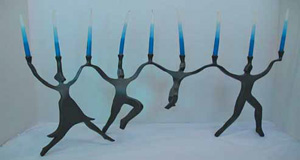
The shuttle from Reagan International Airport to LaGuardia was packed, and Jonathan Birnbaum wondered how many other passengers on board his 737 were thinking about Chanukah candles. He hadn’t missed lighting with his family in a long time, but he had to attend a 2 p.m. meeting with a client in Washington. Missing it was not an option. And trying to explain that the merger should be postponed for 24 hours because he had to light candles with his wife and children was not going to go over well.
The car service dropped Jonathan off at 11:30, and not a creature was stirring in his house. He quickly set up his candles and struck a match to light his shamash. He would catch a quick dinner as the candles burned downward. Maybe he would even eat by the light of the candles in a darkened room. When he was a kid, he used to love doing that, even though his older brother always warned him that it wasn’t the best way to fulfill the mitzvah. He whispered the brachot, the blessings, quietly so as not to wake anyone up, recited Hanerot Halalu to himself, and sang “Maoz Tsur” in an undertone. After he finished, he started to hum a Chanukah tune his grandfather had taught him when he was a child. He closed his eyes and concentrated on the song.
The words to the song were from “Maoz Tsur,” specifically the verse that spoke of the Chanukah miracle. The tune was something between a chassidish niggun and an early Israeli pioneer song, kind of like “Shir Hapalmach.” Jonathan had always sung it in his parents’ house, and he had taught it to his own children as well.
As he started to hum it to himself in the semi-darkness, he had all kinds of Chanukah flashbacks. He saw his grandfather dancing around the room with his hands up in the air and everyone laughing. The man was a serious misnaged, but he would have made a great chassid.
He thought of a Chanukah gift his parents had given him when he was 9. It was a gold-colored Bulova watch with a shiny expansion band. It was a self-winder, and he had always loved that watch. His father was a jeweler, and he always took pride in presents such as this.
Jonathan thought of his wife being very makpid, very strict about the tradition that no woman should do work of any sort while the candles were still burning. He wasn’t sure of the origins of the minhag, but he valued his life and honored the tradition with rigor every year.
As he sang his tune and let the memories flow, he started to sing louder, eyes still closed.
Yevanim, yevanim nikbetsu alay, azay biymei chashmanim, Greeks gathered around me then in Hasmonean days…
The tune was really starting to build, and before he knew it, Jonathan was clapping his hands.
Ufartsu chomot, chomot migdaloai vetimu kol hashmonim, they breached the walls of my towers, and they defiled all the oils…
(The tune required an oy oy oy here, and Jonathan supplied it with verve.)
Jonathan was up on his feet and dancing with his hands up, like his grandfather and his father before him. By now he was singing at the top of his lungs.
Uminotar kanakanim na’asa neis leshoshanim, and from one remnant of the flasks, a miracle was wrought for the roses…
By now he was making a lot of noise. Heads began to appear around the corner of the living room. First his 15-year-old son, the lightest sleeper in the group, then the 6-year-old daughter. Next came the 9-year-old son, and finally the wife, who normally required something on the magnitude of a small earthquake to get her out of bed once she was asleep.
Beney vinah, yemey shmona, kavu shir oorenanim, men of insight–eight days established for song and jubilation…
Everyone joined in Jonathan’s dancing. They formed a circle and kicked their legs with abandon. Even the 15-year-old was dancing, shrugging off his teenage resistance. Everyone was laughing.
The song repeated the last line.
Beney vinah, yemey shmona, kavu shir oorenanim.
Jonathan looked around at his crew in their pajamas. “What are you all doing up?” he growled. “Go back to bed! Tomorrow is a school day.”
They all turned to leave, shaking their heads in disbelief.
“But first,” Jonathan added, “one more time!”
This time, everyone sang together.
By Larry Stiefel











